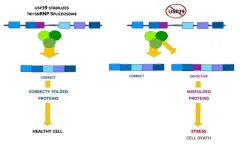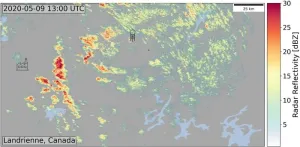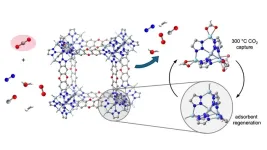(Press-News.org) WASHINGTON, Nov. 14, 2024 – AIP and the National Society of Black Physicists congratulate Danielle Speller as the winner of the 2024 Joseph A. Johnson Award for Excellence. Jessica Esquivel is also being recognized with an Honorable Mention.
The Johnson Award, now in its fifth year, is given jointly by AIP and NSBP to recognize early-career scientists who demonstrate scientific ingenuity and impactful mentorship and service—the core values of NSBP founder Joseph A. Johnson.
“Dr. Speller not only explores the secrets of the universe but also shares them through science outreach and mentorship,” said Michael Moloney, CEO of AIP. “Her research at Johns Hopkins University, which aims to detect new particles and particle interactions, advances the field of dark matter and subatomic particles. Congratulations to Dr. Speller on this prestigious award.”
Speller is honored for her impact in searches for dark matter and neutrinoless double beta decay, and for her efforts to mentor the next generation of aspiring underrepresented physicists. In her research, she uses ultracold detectors to search for small changes in measured power that will provide evidence of new particles and interactions. This type of detection builds upon the current understanding of subatomic particles and provides important information on how things have developed since the beginning of the universe.
“We are delighted to celebrate Dr. Speller’s exceptional work through the Joseph A. Johnson Award, which honors NSBP members that are doing exceptional work in the fields of physics research and mentorship,” said Stephen Roberson, president of the National Society of Black Physicists. “Dr. Speller is a force of positive change within NSBP and in the broader physics community, both as an accomplished physicist and impactful mentor."
“We also applaud Dr. Esquivel for her remarkable contributions to the field of particle physics, and for creating communities that uplift Black physicists.”
Get to Know the 2024 Joseph A. Johnson Award Winner and Honorable Mention
Danielle Speller, Assistant Professor in the William H. Miller III Department of Physics, Johns Hopkins University
Growing up, Speller always set her sights on the stars.
“I was interested in the ideas of far-off galaxies, subatomic particles, and the patterns that had been discovered in nature,” Speller said. “This was bolstered by my enjoyment of school, of reading, learning and sharing new things, and by lively (and entertaining) discussions with my family about popular science fiction scenarios. I wanted to understand the real physics governing the world we live in, and if possible, discover the secrets of the universe.”
Speller received her dual bachelor of physics and bachelor of applied mathematics degrees at North Carolina State University. She then went on to earn a master’s degree and Ph.D. in physics at the University of California, Berkeley. She is currently an assistant professor of physics at Johns Hopkins University, where she serves as the faculty advisor for Johns Hopkins University’s NSBP and Society of Physics Students chapters.
“Receiving this award is an honor,” Speller said. “Honors like this represent the recognition of peers and colleagues, and the value that they place upon your work and upon your efforts to make a lasting difference. I’m inspired by this, and by the legacy of the award’s eponymous scholar, Joseph A. Johnson III.”
Speller was also honored for her mentorship work. Beyond JHU’s SPS and NSBP, Speller is also a member of the American Physical Society.
“Impactful mentorship is intentionally cultivating relationships and seeking to help those whom you mentor to navigate challenging places, miss the potholes, and to give them the tools to be as successful as possible,” Speller said. “I have worked with many excellent colleagues, mentors, students, and peers over the years who enthusiastically embody servant leadership in the encouragement, training, and support of their mentees, professionally and personally.”
Jessica Esquivel, Associate Scientist at the Fermi National Accelerator Laboratory
Jessica Esquivel is a trailblazing physicist, movement builder, and co-founder of Oyanova Enterprises, a company fostering equity, education, and community within science, technology, engineering, arts, and mathematics (STEAM). She was one of the first Afro-Latina women to graduate with a Bachelor of Science in electrical engineering and applied physics from St. Mary’s University and is the second to earn a Ph.D. in physics from Syracuse University. Currently, Esquivel is an associate scientist at Fermilab working on the Muon g-2 Experiment, which precisely measures the anomalous magnetic moment of the muon. Esquivel is also one of the co-founders of the #BlackInPhysics social movement.
“For me, receiving an honorable mention for the Joseph A. Johnson Award affirms the importance of advancing Dr. Johnson’s legacy as I know it, which is to advance equity for Black scientists,” Esquivel said. “As the fight for equity evolves, it demands that we confront not only overt barriers but also the deeply embedded, often hidden forms of discrimination that persist unchecked. Just as Johnson courageously confronted exclusionary practices, I am committed to challenging the structural forces that have long marginalized Black voices in physics, including the insidious forces of sexism and homophobia.”
The award and honorable mentions will be presented at the 2024 National Society of Black Physicists Annual Conference on Nov. 16, in Houston, Texas.
###
About the Joseph A. Johnson III Award for Excellence
Joseph A. Johnson III, of Florida A&M University, was a pioneering and renowned experimental physicist, mentor to many Black doctoral students, and a founder of the National Society of Black Physicists. In honor of his iconic legacy, the American Institute of Physics and NSBP have partnered to recognize an NSBP experimental physicist who exemplifies Johnson’s ingenuity as a scientist and passion for mentorship and service. This honor comes with a $5,000 award along with an invitation to give physics department colloquia at partner universities.
About NBSP
Founded in 1977 at Morgan State University, the mission of the National Society of Black Physicists is to promote the professional well-being of African American physicists and physics students within the international scientific community and within society at large. The organization seeks to develop and support efforts to increase opportunities for African Americans in physics and to increase their numbers and visibility of their scientific work. It also seeks to develop activities and programs that highlight and enhance the benefits of the scientific contributions that African American physicists provide for the international community. The society seeks to raise the general knowledge and appreciation of physics in the African American community.
About AIP
As a 501(c)(3) non-profit, AIP is a federation that advances the success of our Member Societies and an institute that engages in research and analysis to empower positive change in the physical sciences. The mission of AIP (American Institute of Physics) is to advance, promote, and serve the physical sciences for the benefit of humanity.
###
END
2024 Joseph A. Johnson Award Goes to Johns Hopkins University Assistant Professor Danielle Speller
Danielle Speller recognized for neutrinoless double beta decay and dark matter research and mentoring the next generation of aspiring physicists, Jessica Esquivel receives Honorable Mention
2024-11-14
ELSE PRESS RELEASES FROM THIS DATE:
Slow editing of protein blueprints leads to cell death
2024-11-14
FRANKFURT. Genes contain the essential building instructions for life, guiding cells on which amino acids to assemble in what sequence to produce specific proteins. The human genome codes for about 20,000 such instructions. “Nevertheless, our cells can produce several hundred thousand different proteins,” explains Prof. Ivan Đikić from the Institute of Biochemistry II at Goethe University Frankfurt.
This diversity is enabled by a process known as “splicing.” When a cell requires a protein, it generates a copy of the relevant instructions in the cell nucleus. During splicing, this transcript undergoes modification: a cellular editing complex, the spliceosome, ...
Industrial air pollution triggers ice formation in clouds, reducing cloud cover and boosting snowfall
2024-11-14
Pollution from industrial hotspots can trigger ice formation in supercooled clouds, altering their reflective properties and increasing regional snowfall, according to a new study. The findings shed light on poorly understood impacts of anthropogenic aerosols on climate and could help improve climate modeling and mitigation strategies. The impact of human-generated aerosols (tiny air pollution particles) on climate, particularly in counteracting greenhouse gas-induced warming, remains uncertain. These aerosols, in addition to influencing cloud formation as cloud condensation nuclei (CCN), may also act as ice-nucleating particles (INPs), crucial for ice formation in supercooled ...
Emerging alternatives to reduce animal testing show promise
2024-11-14
In a Policy Forum, Chad Nelson and colleagues highlight the efforts of the U.S. Food and Drug Administration (FDA) in advancing alternative methods to reduce animal testing for regulatory use. Animal studies have been crucial for advancing disease understanding, developing therapies, and assessing the safety and effectiveness of consumer products. However, reducing animal use and developing effective alternatives is an ongoing priority. Although advances in biology, engineering, and artificial intelligence offer new opportunities to improve product safety assessments, these technologies require extensive development to meet regulatory ...
Presenting Evo – a model for decoding and designing genetic sequences
2024-11-14
A new study presents “Evo” – a machine learning model capable of decoding and designing DNA, RNA, and protein sequences, from molecular to genome scale, with unparalleled accuracy. Evo’s ability to predict, generate, and engineer entire genomic sequences could change the way synthetic biology is done. “The ability to predict the effects of mutations across all layers of regulation in the cell and to design DNA sequences to manipulate cell function would have tremendous diagnostic and therapeutic implications for disease,” writes Christina Theodoris ...
Global plastic waste set to double by 2050, but new study offers blueprint for significant reductions
2024-11-14
Without intervention, global plastic waste could double by 2050, a new machine learning study predicts. However, according to simulations by the study’s authors, a mix of policy interventions could cut plastic waste by more than 90% and it could cut plastics-related emissions by a third. With UN treaty negotiations underway, these findings provide a crucial blueprint for tackling the plastic crisis. Plastic production has increased relentlessly for decades, leading to surging plastic waste generation and environmental mismanagement. As plastic ...
Industrial snow: Factories trigger local snowfall by freezing clouds
2024-11-14
Anthropogenic aerosols, tiny solid and liquid air pollution particles, have masked a fraction of global warming caused by anthropogenic greenhouse gases. Climate researchers have known for decades that anthropogenic aerosols perturb liquid clouds by enabling the formation of a larger number of cloud droplets, making clouds brighter. A new landmark study led by the University of Tartu suggests that anthropogenic aerosols may also influence clouds by converting cloud droplets to ice at temperatures below zero degrees Celsius.
Powerplant Snow
Using satellite observations, climate researchers discovered unique plumes of ice clouds and reduced cloud cover downwind of industrial hot spots ...
Backyard birds learn from their new neighbors when moving house
2024-11-14
Scientists have found a trigger for social learning in wild animals. An experiment on great tits has pinpointed a single factor—immigration—that can cause birds to pay close attention to others, leading them to rapidly adopt useful behaviors. The study is the first to provide experimental support of a long-held assumption that immigrants should strategically use social learning. The study, conducted by scientists from the Max Planck Institute of Animal Behavior (MPI-AB) and the Cluster of Excellence Collective Behaviour at the University of Konstanz in Germany, is published November 14 in PLOS Biology.
Many animals that live in groups learn from one another, but few ...
New study in Science finds that just four global policies could eliminate more than 90% of plastic waste and 30% of linked carbon emissions by 2050
2024-11-14
Berkeley, CA/Santa Barabara, CA (14 November 2024) — A new study released in Science today determines that just four policies can reduce mismanaged plastic waste — plastic that isn’t recycled or properly disposed of and ends up as pollution — by 91% and plastic-related greenhouse gasses by one-third. The policies are: mandate new products be made with 40% post-consumer recycled plastic; cap new plastic production at 2020 levels; invest significantly in plastic waste management — such as landfills and waste collection services; and implement a small fee on plastic packaging. ...
Breakthrough in capturing 'hot' CO2 from industrial exhaust
2024-11-14
Industrial plants, such as those that make cement or steel, emit copious amounts of carbon dioxide, a potent greenhouse gas, but the exhaust is too hot for state-of-the-art carbon removal technology. Lots of energy and water are needed to cool the exhaust streams, a requirement that has limited adoption of CO2 capture in some of the most polluting industries.
Now, chemists at the University of California, Berkeley, have discovered that a porous material can act like a sponge to capture CO2 at temperatures close to those of many industrial exhaust streams. ...
New discovery enables gene therapy for muscular dystrophies, other disorders
2024-11-14
Gene therapy can effectively treat various diseases, but for some debilitating conditions like muscular dystrophies there is a big problem: size. The genes that are dysfunctional in muscular dystrophies are often extremely large, and current delivery methods can’t courier such substantial genetic loads into the body. A new technology, dubbed “StitchR,” surmounts this obstacle by delivering two halves of a gene separately; once in a cell, both DNA segments generate messenger RNAs (mRNAs) that join seamlessly together to restore expression of a protein that is missing or inactive in disease.
Published in ...
LAST 30 PRESS RELEASES:
Scientists show how to predict world’s deadly scorpion hotspots
ASU researchers to lead AAAS panel on water insecurity in the United States
ASU professor Anne Stone to present at AAAS Conference in Phoenix on ancient origins of modern disease
Proposals for exploring viruses and skin as the next experimental quantum frontiers share US$30,000 science award
ASU researchers showcase scalable tech solutions for older adults living alone with cognitive decline at AAAS 2026
Scientists identify smooth regional trends in fruit fly survival strategies
Antipathy toward snakes? Your parents likely talked you into that at an early age
Sylvester Cancer Tip Sheet for Feb. 2026
Online exposure to medical misinformation concentrated among older adults
Telehealth improves access to genetic services for adult survivors of childhood cancers
Outdated mortality benchmarks risk missing early signs of famine and delay recognizing mass starvation
Newly discovered bacterium converts carbon dioxide into chemicals using electricity
Flipping and reversing mini-proteins could improve disease treatment
Scientists reveal major hidden source of atmospheric nitrogen pollution in fragile lake basin
Biochar emerges as a powerful tool for soil carbon neutrality and climate mitigation
Tiny cell messengers show big promise for safer protein and gene delivery
AMS releases statement regarding the decision to rescind EPA’s 2009 Endangerment Finding
Parents’ alcohol and drug use influences their children’s consumption, research shows
Modular assembly of chiral nitrogen-bridged rings achieved by palladium-catalyzed diastereoselective and enantioselective cascade cyclization reactions
Promoting civic engagement
AMS Science Preview: Hurricane slowdown, school snow days
Deforestation in the Amazon raises the surface temperature by 3 °C during the dry season
Model more accurately maps the impact of frost on corn crops
How did humans develop sharp vision? Lab-grown retinas show likely answer
Sour grapes? Taste, experience of sour foods depends on individual consumer
At AAAS, professor Krystal Tsosie argues the future of science must be Indigenous-led
From the lab to the living room: Decoding Parkinson’s patients movements in the real world
Research advances in porous materials, as highlighted in the 2025 Nobel Prize in Chemistry
Sally C. Morton, executive vice president of ASU Knowledge Enterprise, presents a bold and practical framework for moving research from discovery to real-world impact
Biochemical parameters in patients with diabetic nephropathy versus individuals with diabetes alone, non-diabetic nephropathy, and healthy controls
[Press-News.org] 2024 Joseph A. Johnson Award Goes to Johns Hopkins University Assistant Professor Danielle SpellerDanielle Speller recognized for neutrinoless double beta decay and dark matter research and mentoring the next generation of aspiring physicists, Jessica Esquivel receives Honorable Mention





